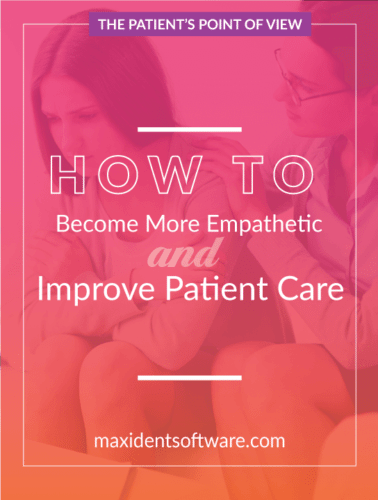
This series alone is my way of helping you practice empathy with your patients by giving you a glimpse into why some patients feel and act the way they do, providing you with insight and possible solutions. But so often empathy is mistaken for sympathy and I think it’s time to set the record straight once and for all. The biggest problem with this common mistake is that many dental professionals neglect empathy.
How a patient feels before, during, and after an appointment can significantly affect a practice’s bottom line, which is why customer service and patient care require the use of empathy. In the article, “How to be Empathetic” by Elliot D. Cohen Ph.D., the benefits of practicing empathy are not only beneficial to your patients but to those relationships you maintain outside the office. Basically, it’s accurate to say that empathy is important in all aspects of your life.
So the first question to ask before we delve into the how-to of becoming more empathetic is What is empathy? Cohen describes empathy in that it involves “resonating with what is going on in the subjective world of another.” We cannot empathize if we don’t understand what is going on with the other person; to do that, you need to be able to walk in their shoes. For some, this is incredibly difficult to do and empathy does not come as easily, but Cohen’s answer is practice. “In order to become empathetic, you need to work at it by being empathetic.”
Below are just a few of Cohen’s guidelines to becoming more empathetic and how to do so specifically with your patients and others in your circle.
Focus your attention on the welfare, interests, and needs of others
To be sincerely empathetic to someone’s plight, you need to take time to attain certain knowledge. This is particularly crucial in a dental practice as most patients come in feeling that they are basically a cash grab. It is how I felt the first time I made my appointment. Taking time to get to know your patients on a level that is a little more than medical will convince them that you do see them as human beings. If the plan is to become more empathetic with your patients then getting to know them, their fears, their anxieties and even what brings them joy is the first significant step.
Key into shared human values
[dt_quote type=”blockquote” font_size=”big” animation=”none” background=”plain”]“Such ability to key into the welfare, interests, and needs of others also requires the ability to take another’s value perspective.”[/dt_quote]
Rather than understanding your patient’s specific fear of needles (especially if that fear doesn’t apply to you), you can instead tap into a general fear of something that may have caused you a significant amount of pain or distress. You are empathizing with that shared value of fear of something painful or stressful. This is the point in which you practice being in the shoes of your patient “and imagine how you too would feel if you were confronting the identical situation.” Stay away from phrases such as “it doesn’t hurt that much” or “you’ll barely feel it,” because unless that statement is true, you are not so much empathizing than providing a falsehood and that tends to annoy most people; not only that but patients will be less likely to trust you in the future and will, therefore, ignore your advice entirely and might even seek out a second opinion.
Suspend, temporarily, your own considered judgments and critiques
We all have a tendency to judge and critique; it’s part of our nature, it’s how we make sense of the world around us, but there is no room for this when you are practicing empathy. In the case of my hypersensitive gag reflex, I was told to, in no uncertain terms, get over it by the Dental Assistant there. I was not happy. The way she was talking to me made me feel like a child, because clearly in her eyes only children have this issue. Her judgment was almost tangible in the room and even though the Dentist was very good about it, I could still feel the Dental Assistant’s words and judgment rattling around in my head.
Suspend the judgment. Sometimes attempting to fix something using harsh words or tones only make the situation worse. What else makes the situation worse is lying. A good friend of mine was told during a treatment that when it came to pain “you will not feel a thing.” This was a lie. She specifically told the Dentist and the Dental Assistant that she had very sensitive teeth and gums and that the average amount of freezing almost never works on her. But because they either weren’t listening or they simply didn’t believe her, she suffered a lot of pain for what should have been a short treatment, and she never went back there.
Why did they lose her as a patient? Simple. They didn’t listen. They refused to suspend their judgment of her issue and pressed on anyway.
Listen to the target
This brings us right to one of the most important aspects of empathy. It is impossible to practice being empathetic if you won’t even take the time to listen. “Listening carefully to the target’s narrative is accordingly essential in producing useful reflections.” But the kind of listening matters, too. Active listening requires you to not only listen but participate in the discussion by asking open-ended questions. Doing so, according to Cohen, allows you to “capture deeper meanings and implications of what the target is saying.”
Listening also does not mean talking at or lecturing once you’ve heard what the person has to say. I know several Dental and Medical Professionals who do this, and it is not beneficial to your practice or your patients. Talking at or lecturing your patient means you are not being empathetic, and you should make a significant effort to break this bad habit if practicing empathy and fostering feelings of trust and comfort is your goal.
Connect with the target
To connect with someone, you have to be willing to suspend your own value beliefs and put yourself in that someone’s shoes. This kind of “connected knowing” is imagining how you would feel were you in that other person’s place, feeling what they feel and suffering from the fears and anxieties with which they suffer. Listening actively to understand that suffering and those fears and anxieties will help your patient to open up and develop a relationship with you. With this kind of connection, not only will you be able to provide sincere comfort to your patient but you will also be able to contribute to a long-term solution that they might trust you enough to agree with.
Conclusion
How important is empathy to the success of your practice? Very important. Being able to walk in someone else’s shoes gives you a chance to understand the fear, anxiety, and the issues your patients struggle with. Additionally, it helps you to find a solution that best fits the patient. It is with empathy that one can “promote trust, leading to open and honest communication, thereby facilitating resolution of interpersonal conflicts and constructive change.”
It only takes one negative experience to deter a patient from returning to your practice, so all Dental Professionals, including those at the front-end and those working alongside the Dentists, should be practicing empathy as often as possible.
Resources:
- How to Be Empathetic: Find out what you can do to improve your relationships
- Emotional Intelligence
- 9 Habits of Highly Emotionally Intelligent People
Suggested Page



